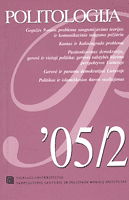Šou principų dėsningumai Lietuvos politiniame gyvenime
Consistency of the Principles of the Show-Making in Lithuania's Political Life
Author(s): Lauras BielinisSubject(s): Politics / Political Sciences
Published by: Vilniaus universiteto leidykla & VU Tarptautinių santykių ir politikos mokslų institutas
Keywords: system of simuliacrs¸ J.Baudrillard¸ society of the spectacle¸ G.Debord¸ the theatrocracy¸ G.Balandier¸ processes of democratic fragmentation
Summary/Abstract: In this article the author demonstrates in what way the "system of simuliacrs" (J.Baudrillard), "the society of the spectacle" (G.Debord), and "the theatrocracy" (G.Balandier) earmark the processes of democratic fragmentation. This is the situation when the society, having undergone a successful implementation of the state of civil relations, evolves into a somewhat new level. On this level we witness the processes of self-organization and government taking hold - namely, that of a "dispersed crowd". Generation of self-understanding and the meanings through the form of communication (the aesthetic, emotional aspects) can be denoted as one of the freshest characteristics. The machinery of the theatre, decorations, the ideology of performance has established itself in the conscience of the TV personnel. It has become the single and unique, synthetic substance of the world outlook of the society. Here we see everything being substituted for everything and everybody finding what he or she needs. TV communication implements the ideal political functionality. In the TV-shows politics transforms itself from being serious and self-responsible action, which bears in itself the ideological, social and other elements of the state, into a decoration of the government that conceals the existing and potential freedom of action of the authorities. What it finds instead is the claim to be called the real authority and politics. However, we do not observe the systemic and strategically oriented move necessary for the further evolution of state. In this case the repercussions for the media itself turn out to be unanticipated and problematic. This makes the media look for the means of its own to subjugate the attention the society pays to its interests. Under such circumstances the modality of the show, the performance becomes dominating. The way of informing takes over the characteristics, such as the attractiveness, sensual simulation of the reality, elements of the carnival, cartooning and decoration, and improvisation. As regards the information being provided to the audience, the messages the media and the politicians find impossible to be conferred to the spectators as a serious argument are well delivered by means of a well-assimilated show. This means that the contemporary system of mass communication seizes the opportunity to fulfil each and every will and need of the consumer. At the same time, however, this system takes over the initiative to tell the consumer what these wills and needs are. The article sees itself divided into the following parts: (1) Political Mediatization; (2) The Mirage of the Live Coverage; (3) The Political Show; (4) The "Stars" System.
Journal: Politologija
- Issue Year: 2002
- Issue No: 1 (25)
- Page Range: 21-39
- Page Count: 19
- Language: Lithuanian

